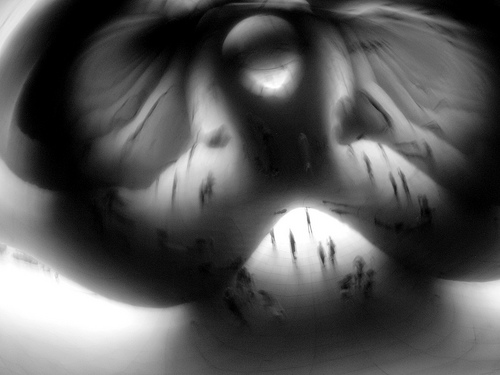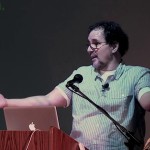We run our website the way we wished the whole internet worked: we provide high quality original content with no ads. We are funded solely by your direct support. Please consider supporting this project.

Evolution as Believers-A Clarification
Hi friends,
We received an unusual amount of e-mail and quite a few comments on my Facebook page in response to my little post on evolution a few days ago. I appreciate all of it, including the critical comments. Thank you!
As I reflect on my post in light of this feedback, I can see that I assumed too much and thus said too little. Several people correctly pointed out that the word “Evolution” is ambiguous. For example, does believing in evolution entail the acceptance of “abiogenesis” -that is, the conviction that life spontaneously arose by strictly natural means (that is, without divine influence) out of non-living matter? Does believing in evolution imply that one accepts that all forms of life, including humans, evolved by natural processes alone (e.g. spontaneous mutations, cataclysmic environmental alterations, natural selection, etc.)? Could one be said to embrace evolution if they believe that the process involved divine guidance, at least in the sense that God originally designed nature such that life would evolve in a way that led to the creation of homo sapiens? Is it consistent with evolution to go beyond this and affirm that God influenced natural processes in a way that is undetectable by the scientific methodology? Or could one go even further and hold that God interjected new designs at crucial points in the process that require an appeal to divine intelligence to be explained (the “Intelligent Design” perspective)?
Clearly, without specifying what one means by “evolution,” as I did in my brief post, you force readers to guess at your meaning, and this leads to unnecessary confusion and misunderstandings. So, here’s my clarification.
When I expressed my various concerns about the rejection of “evolution” as a pastor, citizen, apologist and theologian, I was merely referring to young earth creationism, such as we find with Ken Ham’s “Answers in Genesis.” This is the only perspective I know of that dismisses the entire evolutionary paradigm of modern science. From my involvement with BioLogos — a very informative and important think tank, by the way — I’ve learned that, while the creationist movement is dismissed by the scientific establishment and the broader academic community, it is very well funded and organized, which is why it must be taken seriously by those of us who care about the credibility of the Christian faith and the future of the Church. This movement is exerting a tremendous influence on the evangelical church today, and it’s the primary reason the number of American Christians who reject the entire evolutionary paradigm is increasing, and at a rather alarming rate. For all the reasons I gave in my previous post, I believe this could, over the long haul, prove disastrous for the Church in America (and everywhere else it exerts a strong influence).
I believe there are a number of plausible ways for Christians to integrate Genesis 1 and 2 as well as the broader Christian faith with the theory of evolution — which is to say, there are a number of ways of understanding how God created humans in his image by evolutionary means. I think its obvious that the belief that God is the Creator and that humans are made in the image of God entails that Christians must deny that life on earth, and that human beings in particular, are the product of natural processes alone. We must, in other words, deny that naturalistic evolution “tells the whole story” about life on earth and about humans. But this doesn’t mean we must deny that naturalistic evolution is an inadequate biological theory.
There are a number of Christian evolutionary biologists who argue that divine intelligence must be appealed to in order to account for “irreducibly complex” phenomena, such as the eye (this is the “Intelligent Design Movement”). But I’ve heard and read plenty of others
(such as those at BioLogos) who give persuasive naturalistic explanations for these phenomena and who argue that appealing to anything “supernatural” (e.g. “divine intelligence”) to explain natural phenomena is simply bad science. Yet, this group nevertheless confesses, by faith, that God is the Creator who, by means undetectable by science, guided the evolutionary process.
I have my own theory about how God was involved in the evolutionary process (and, in my view, his involvement included warring against Satan and other anti-creational forces). But in terms of my concern about the growing creationist movement, I am not interested in leveraging anything on my own theory or with engaging in any other particular theory. I instead just celebrate the fact that there are thoughtful Christians who embrace science and who wrestle with scientific and theological issues from the inside of the Christian faith
instead of requiring people to declare war on science as a precondition to entering the kingdom.
Hope that clears things up a bit.
Keep thinking!
~Greg
Image by Kevin Dooley. Used in accordance with Creative Commons. Sourced via Flickr.
Related Reading

The Importance of Science and Theology
Why is a dialogue between theology and science important? Many assume that they operate independently of one another, but the fact is that they influence each other more than we realize. Listen to Greg’s introductory answer to this question and discover how newer insights from science actually support what we read in the Bible. This…

Podcast: Did You Believe in Evolution When You Wrote Letters from a Skeptic?
Greg considers how to think about God’s relationship to time given that there are apparent paradoxes no matter how one things about it. http://traffic.libsyn.com/askgregboyd/Episode_0319.mp3

Can Science Inform Our Theology?
Over the last century, we have witnessed a revolution in various areas of science that relate to how we see the world and even God. For example, the Platonic notion that time and change are less real than timeless stability is being abandoned in light of the fact that physicists work from the assumption that…

An Apology from Greg
Ken Ham, the head of Answers In Genesis has called on me to publicly apologize and “retract [my] false statement” when I insinuated that he “preaches a false Gospel” by requiring “people to declare war on science as a precondition to entering the kingdom.” Ken pointed out that his organization’s Statement of Faith states that,…

The Cosmic Dance: Why Will This Book Benefit Me?
Greg took a few moments to describe how he hopes you’ll benefit from The Cosmic Dance. Discover how various branches of science demonstrate that life itself is a delicate dance between order and chaos. You’ll find that we’re wired to live on the edge in a place of creativity, spontaneity and significance in the adventure…

The Warfare Worldview
The Warfare Worldview from Roberta Winter Institute on Vimeo. Here’s a video presentation that Greg did at the Roberta Winter Institute regarding the Warfare Worldview. Enjoy!
